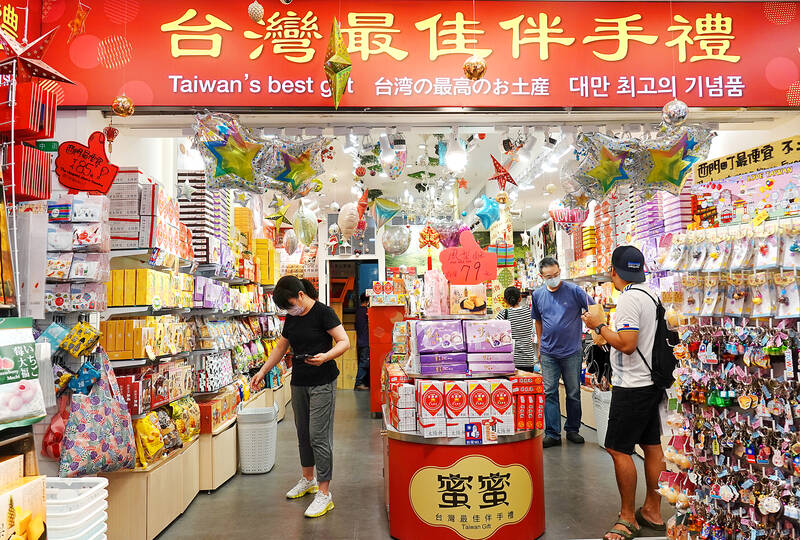The consumer confidence index this month rebounded from a one-year low last month, as all six subindices increased, a report released yesterday by National Central University said.
The index grew 8.83 points month-on-month to 72.2, and rose 8.53 points on an annual basis, the report said.
The report was based on a survey of 3,060 people aged 20 or older from across Taiwan between May 18 and Tuesday last week, the university said.

Photo: CNA
Six subindices are used to gauge the public’s sentiment over the next six months: consumer prices, household finances, economic climate, job opportunities, stock investments and purchases of durable goods.
This month, people’s expectations of stock investments increased the most, climbing 34.7 points from last month to 59.35, as the TAIEX continued to hit new highs thanks to the artificial intelligence boom, the report said.
The TAIEX yesterday closed up 1.11 percent at 21,803.77 points, after hitting an intra-session high of 21,871.34, Taiwan Stock Exchange data showed.
Of those polled, 26.3 percent said they would invest in stocks in the next six months, compared with 9.5 percent last month, while 66.9 percent said they would stay away from the market in the near term, down from 84.9 percent last month.
The subindex on job opportunities increased by the second-largest amount, moving up 4.94 points to 69.66, followed by the household finances subindex, which rose 4.19 points to 78.84, and the subindex on purchases of durable goods, which rose 3.3 points to 111.09, the report said.
Meanwhile, the subindex on consumer prices grew the least among the six subindices, increasing 2.61 points to 31.39, as electricity rate hikes still weighed on people’s inflation outlook, it said.
While the consumer confidence index rose this month, five of its subindices were still below 100 points, indicating that the public is relatively pessimistic about the next six months, the report said.
The index for home purchases this month increased 3.5 points month-on-month to 106.27, a survey the university conducted with Taiwan Realty Co (台灣房屋) showed.
This indicated that people remained optimistic about property buying opportunities, the university said.
Of the respondents, about 38.5 percent said they intended to buy a new house in the next six months, 27.4 percent said they would not, while 34 percent said they did not know, the survey showed.

Nvidia Corp CEO Jensen Huang (黃仁勳) is expected to miss the inauguration of US president-elect Donald Trump on Monday, bucking a trend among high-profile US technology leaders. Huang is visiting East Asia this week, as he typically does around the time of the Lunar New Year, a person familiar with the situation said. He has never previously attended a US presidential inauguration, said the person, who asked not to be identified, because the plans have not been announced. That makes Nvidia an exception among the most valuable technology companies, most of which are sending cofounders or CEOs to the event. That includes

TARIFF TRADE-OFF: Machinery exports to China dropped after Beijing ended its tariff reductions in June, while potential new tariffs fueled ‘front-loaded’ orders to the US The nation’s machinery exports to the US amounted to US$7.19 billion last year, surpassing the US$6.86 billion to China to become the largest export destination for the local machinery industry, the Taiwan Association of Machinery Industry (TAMI, 台灣機械公會) said in a report on Jan. 10. It came as some manufacturers brought forward or “front-loaded” US-bound shipments as required by customers ahead of potential tariffs imposed by the new US administration, the association said. During his campaign, US president-elect Donald Trump threatened tariffs of as high as 60 percent on Chinese goods and 10 percent to 20 percent on imports from other countries.

Taiwanese manufacturers have a chance to play a key role in the humanoid robot supply chain, Tongtai Machine and Tool Co (東台精機) chairman Yen Jui-hsiung (嚴瑞雄) said yesterday. That is because Taiwanese companies are capable of making key parts needed for humanoid robots to move, such as harmonic drives and planetary gearboxes, Yen said. This ability to produce these key elements could help Taiwanese manufacturers “become part of the US supply chain,” he added. Yen made the remarks a day after Nvidia Corp cofounder and chief executive officer Jensen Huang (黃仁勳) said his company and Taiwan Semiconductor Manufacturing Co (TSMC, 台積電) are jointly

United Microelectronics Corp (UMC, 聯電) expects its addressable market to grow by a low single-digit percentage this year, lower than the overall foundry industry’s 15 percent expansion and the global semiconductor industry’s 10 percent growth, the contract chipmaker said yesterday after reporting the worst profit in four-and-a-half years in the fourth quarter of last year. Growth would be fueled by demand for artificial intelligence (AI) servers, a moderate recovery in consumer electronics and an increase in semiconductor content, UMC said. “UMC’s goal is to outgrow our addressable market while maintaining our structural profitability,” UMC copresident Jason Wang (王石) told an online earnings